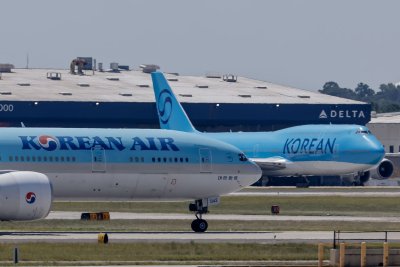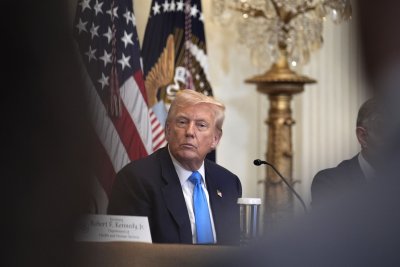Korean workers’ charter flight to Seoul delayed; no reason given

Departing Korean Airlines planes pass each other at Hartsfield-Jackson Atlanta International Airport in Atlanta, Ga., on Wednesday. A Korean Air charter plane is expected to repatriate about 300 South Korean workers who were among 475 arrested during a U.S. Immigration and Customs Enforcement raid at a construction site for an electric vehicle battery plant being built by Hyundai Motor Group-LG Energy in Ellabell, Ga. South Korean officials continue to negotiate the repatriation charter flight for the detainees. Photo by Erik S. Lesser/EPA
Sept. 10 (UPI) — The exit of 300 Korean workers detained in Georgia has been delayed due to “a cause from the U.S. side,” according to the South Korean Ministry of Foreign Affairs.
The detainees were scheduled to board a Korean Air charter plane from Atlanta’s Hartsfield-Jackson International Airport to head home Wednesday afternoon. The ministry hasn’t said what is causing the delay, The Korea Times reported.
“The government is continuing consultation with the U.S. for as swift a departure as possible. We will provide further updates once a new schedule is confirmed,” it said.
Homeland Security Investigations, Immigration and Customs Enforcement and other law enforcement conducted the raid on Thursday and said those who were detained are not authorized to work in the United States.
Three of those detained are from Japan, and others were from Central and South American nations.
The electric battery plant in Ellabell, Ga., near Savannah, is still under construction. It’s a joint project by Hyundai and LG Energy Solution to provide batteries for Hyundai electric vehicles.
Many of those working at the plant had B-1 visas, which are issued for short-term business travel, The Korea Herald reported.
Many others got electronic travel authorization to visit the United States, but neither B-1 visas nor the travel authorizations allowed their respective holders to work.
The Korean government has stressed that the workers will leave under the rules of voluntary departure, which don’t have the same legal consequences as deportation. But, U.S. immigration law allows for bans depending on the length of the unlawful stay, so individual penalties are possible.
Complicating matters, some detainees signed forms early on that included a $1,000 payment for voluntary departure to avoid a 10-year entry ban, The Korea Times reported.
Adding to the confusion, U.S. Secretary of Homeland Security Kristi Noem said Monday that the Korean nationals detained in the raid will be “deported.”
In South Korea, people are upset, said James Kim, chair and CEO of the American Chamber of Commerce in Seoul.
“The sentiment is obviously very, very negative,” James Kim, told CBS News. “In my office, I usually have my TV turned on to the news — and this is obviously covered from morning to evening constantly. But everyone who I speak to, they view America as its number — one partner here from South Korea. Yes, we’re going to have some challenging times.”
South Korean Foreign Minister Cho Hyun heard demands from angry lawmakers during a parliamentary session in Seoul on Monday, before he departed for meetings with Secretary of State Marco Rubio and other U.S. officials, CBS News reported.
Lawmaker Kim Joon-hyun demanded that Cho respond to the ICE raid by launching investigations into every U.S. national teaching English in South Korea who could be working illegally on a tourist visa.
“Are we giving our money, technology, and investment to the United States only to be treated like this?” CBS News reported that Kim Joon-hyun said.
During his meeting Wednesday in Washington with Cho, Rubio said, “the United States welcomes ROK (South Korea) investment into the United States and stated his interest in deepening cooperation on this front,” according to a readout shared by the State Department.
Rubio and Cho discussed advancing U.S.-South Korean ties “through a forward-looking agenda” that “revitalizes American manufacturing through ROK investment in shipbuilding and other strategic sectors, and promotes a fair and reciprocal trade partnership,” the State Department said.
Seoul and Washington have clashed over administrative and technical procedures, including the terms under which the Koreans are released and the conditions for their transfer to the airport, The Korea Herald reported.
Kim Yong-beom, presidential chief of staff for policy, on Tuesday also said that “(U.S.) law enforcement authorities have their own methods they insist on when it comes to transporting detainees by bus.
“They insist on certain practices, such as handcuffing detainees again, but we are making every effort in the final administrative negotiations to ensure that such methods are not applied,” Kim Yong-boem said.
“We are working to complete the procedures so that our nationals can safely return in the form of voluntary departure, not deportation, and are striving to conclude this within a timely period – within a day or two.”
The drive from the ICE detention facility in Folkston, Ga., to the Atlanta airport takes about four and a half hours.
